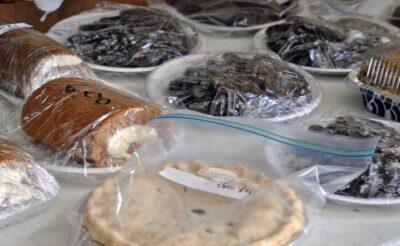
Image source: Amish365
Selling homemade pies, cakes and cookies would no longer be illegal in New Jersey under a bill that unanimously passed the state Assembly.
“This is a simple, common sense solution as it will allow individuals to earn extra money through the sale of their home-baked goods … without incurring significant overhead costs,” State Assemblywoman Alison McHose (R-Sussex), the sponsor of bill, A-1244, told The Star-Ledger newspaper.
Currently, it is illegal to sell baked goods that were not prepared in a state-inspected kitchen in New Jersey. That law effectively prevents people from selling items made in their kitchens at fairs, farmers’ markets, church bake sales and other public venues.
New Jersey is one of five states with no cottage food law, although several other states nationwide have laws that are considered unfriendly to the industry, according to CottageFoods.org.
Make “Off-The-Grid” Super Foods Secretly In Your Home
For instance, Oklahoma doesn’t allow the sale of goods with fresh fruit. Cottage food refers to homemade food sold to the public commercially. Only 20 states have laws that don’t “arbitrarily limit how much home bakers can earn,” according to the Institute for Justice.
What A-1244 Allows
A-1244 is being hailed as a victory for the cottage-food industry in the Garden State. Here’s what A-1244 does:
- Allows the sale of homemade ready-to-eat baked goods such as pies, pastries and cookies.
- Foods that require refrigeration such as sandwiches or soups would still have to be made in a state-inspected kitchen.
- Requires sellers of homemade baked goods to put up a sign telling the public that the food was not cooked in a state-inspected kitchen.
“New Jersey is one of just five states that do not yet have cottage food laws,” an Institute for Justice press release noted. “Under the state’s current regime, it’s illegal for people to sell food they make at home. Instead, they must either rent space at a shared commercial kitchen or install a commercial kitchen in their homes, which can be prohibitively expensive.”
The legal rights organization has sued the state of Minnesota over a law that limits home bakers to just $5,000 worth of baked goods a year.
Expansion of Economic Freedom

Image source: Dallas Observer
McHose sees expanding cottage food as an issue of economic freedom to help families survive tough times.
“In today’s difficult economy, it’s important that we look for opportunities to help people supplement their incomes,” she told The Star-Ledger.
A-1244 will still have to pass the state Senate and be signed by the governor to become law. If that happens, New Jersey will be one of a number of states expanding cottage food business opportunities for citizens.
Other states that have expanded such opportunities include:
- Mississippi, where Governor Phil Bryant signed Senate Bill 2687, which limits city and county governments’ ability to restrict food sales.
- Texas, where the Cottage Food Law has been changed to allow the sale of baked goods outside of homes. The old law only let bakers sell goods in their homes. Now the bakers can sell at festivals, farmers’ markets and fairs.
- California, where the California Homemade Food Act passed in 2012 has led to the creation of 1,200 businesses, Forbes reported. California even has a permit for cottage food businesses.
Despite the expansion of food freedom, states still have ridiculous restrictions on cottage food. The Institute for Justice noted that in Mississippi, it is still illegal for home bakers to advertise their products online.
What do you think of cottage food laws? Tell us in the comments section below.
Sign up for Off The Grid News’ weekly email and stay informed about the issues important to you
 Off The Grid News Better Ideas For Off The Grid Living
Off The Grid News Better Ideas For Off The Grid Living



